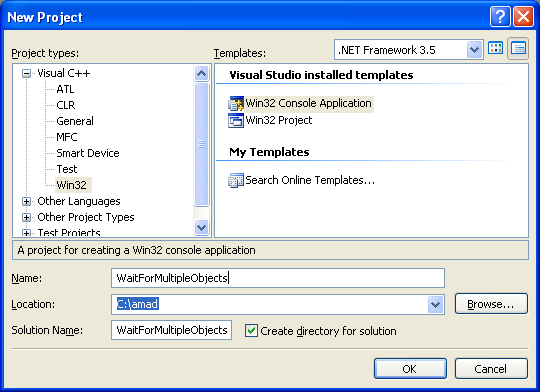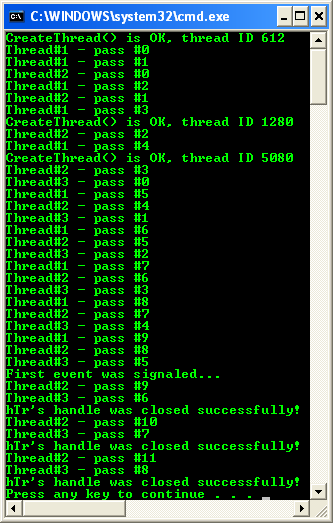Windows Thread Synchronization 15
The WaitForMultipleObjects() Example
In the next program, a primary threads starts up three threads. Each of threads prints out its name and some numbers. The primary thread waits till the first thread terminates.
Create a new empty Win32 console application project. Give a suitable project name and change the project location if needed.

Then, add the source file and give it a suitable name.

Next, add the following source code.
// The main thread waits till the first child terminates
#include <windows.h>
#include <stdio.h>
#define THREADCOUNT 3
/////Thread counts till MaxValue
void ThreadMain(WCHAR * ThreadInfo)
{
WCHAR Name[20];
DWORD MaxValue = 5, i;
swscanf_s(ThreadInfo,L%S %d, Name, sizeof(Name), &MaxValue, sizeof(MaxValue));
for(i=0;i<MaxValue;++i)
{
wprintf(L%S - pass #%d\n, Name, i);
}
}
//Main
int wmain(void)
{
HANDLE hThr[THREADCOUNT];
DWORD i, dwRet;
WCHAR *Buf[THREADCOUNT]= {LThread#1 10, LThread#2 20, LThread#3 30};
for(i=0;i<THREADCOUNT;i++)
{
DWORD ThreadId;
hThr[i] = CreateThread(NULL,0,(LPTHREAD_START_ROUTINE)ThreadMain, (LPVOID)Buf[i],0,&ThreadId);
if(hThr[i]== NULL)
{
wprintf(LCreateThread() failed, error %u\n, GetLastError());
ExitProcess(1);
return 1;
}
else
wprintf(LCreateThread() is OK, thread ID %u\n, ThreadId);
}
// Blocks/waits till all child threads are finished
// If 3rd TRUE, the function returns when the state of all objects in the handle array is signaled.
// If FALSE, the function returns when the state of any one of the objects is set to signaled
// The INFINITE - the function will return only when the specified objects are signaled.
dwRet=WaitForMultipleObjects(THREADCOUNT,hThr,FALSE,INFINITE);
switch(dwRet)
{
// hThr[0] was signaled
case WAIT_OBJECT_0 + 0:
// TODO: Perform tasks required by this event
wprintf(LFirst event was signaled...\n);
break;
// hThr[1] was signaled
case WAIT_OBJECT_0 + 1:
// TODO: Perform tasks required by this event
wprintf(LSecond event was signaled...\n);
break;
// hThr[2] was signaled
case WAIT_OBJECT_0 + 2:
// TODO: Perform tasks required by this event
wprintf(LThird event was signaled...\n);
break;
// ...
// Time out
case WAIT_TIMEOUT:
wprintf(LThe waiting is timed out...\n);
break;
// Return value is invalid.
default:
wprintf(LWaiting failed, error %d...\n, GetLastError());
ExitProcess(0);
}
/*
if(dwRet>=WAIT_OBJECT_0 && dwRet<WAIT_OBJECT_0+THREADCOUNT)
{
wprintf(LThe first thread terminated with index: %u\n,dwRet-WAIT_OBJECT_0);
}
*/
// close all handles to threads
for(i=0;i<THREADCOUNT;i++)
{
if(CloseHandle(hThr[i]) != 0)
wprintf(LhTr's handle was closed successfully!\n);
else
wprintf(LFailed to close hTr's handle, error %u\n, GetLastError());
}
ExitProcess(0);
return 0;
}
Build and run the project. The following screenshot is a sample output.

< Thread Synchronization 14 | Thread Synchronization Programming | Win32 Programming | Thread Synchronization 16 >